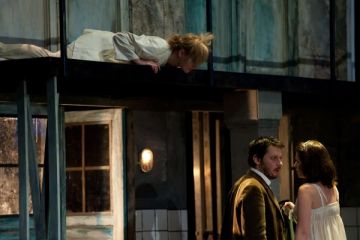Aristophanes
Lysistrata or The City of Women
Main stage
Lysistrata
Hilda Péter
Myrrhini
Enikő Györgyjakab
Stratyllis
Júlia Albert
Caloniki
Andrea Vindis
Lampito
Eszter Tompa
Ismenia
Tünde Skovrán
Krytilli
Júlia Laczó
Athenian Woman
Melinda Kántor
Corinthian Woman
Réka Csutak
Spartan Woman
Andrea Kali
The Daughter of the Corinthian Woman
Éva Imre
Young Spartan Women
Noémi Daróczi, Krisztina Biró
Magistrate
Gábor Viola
Cinesias
Loránd Váta
Drakis
Miklós Bács
Philurgos
Lehel Salat
Phadrias
Ferenc Sinkó
Strynidoros
Alpár Fogarasi
The Spartan Herald
Szabolcs Balla
The Nurse
Róbert Laczkó Vass
The Senators
Szabolcs Balla, Levente Imecs
Lovers
Ferenc Sinkó, Eszter Tompa, Róbert Laczkó Vass, Andrea Vindis, Levente Imecs, Éva Imre
The Fool
Anikó Pethő
directed by
Dominique Serrand dramaturg
András Visky, Noémi Krisztina Nagy set design
Dominique Serrand costume design
Dominique Serrand, Carmencita Brojboiu director's assistant
Tom Dugdale stage manager
Péter Mixtay, Imola Kerezsy musical coordinator
Katalin G. Incze
Hilda Péter
Enikő Györgyjakab
Júlia Albert
Andrea Vindis
Eszter Tompa
Tünde Skovrán
Júlia Laczó
Melinda Kántor
Réka Csutak
Andrea Kali
Éva Imre
Noémi Daróczi, Krisztina Biró
Gábor Viola
Loránd Váta
Miklós Bács
Lehel Salat
Ferenc Sinkó
Alpár Fogarasi
Szabolcs Balla
Róbert Laczkó Vass
Szabolcs Balla, Levente Imecs
Ferenc Sinkó, Eszter Tompa, Róbert Laczkó Vass, Andrea Vindis, Levente Imecs, Éva Imre
Anikó Pethő
directed by
Dominique Serrand
András Visky, Noémi Krisztina Nagy
Dominique Serrand
Dominique Serrand, Carmencita Brojboiu
Tom Dugdale
Péter Mixtay, Imola Kerezsy
Katalin G. Incze
Date of the opening: October 08, 2010
Adaptation by George Theodoridis
A play I had never seen.
Nor even read until late in my life.
A Catholic pupil during my childhood could not read in school a text of such sexuality, vulgarity and lack of morals, but only of Christian morality.
However, I regret not having read it earlier and having missed the shock-wave, the disturbing experience.
When I finally discover it, I am both stunned and comforted.
The awful representation of the elders, bitter and mean, the cynicism of the married women, the young people manipulating and lying for their own ends, and then this foolish idea, cynical too, that a sex strike could stop the war – Aristophanes offers a biting parody.
It is therefore with this regret at having discovered this play at such a late stage in my life, at a time when its cynicism comforted my own, that I feel like paying a tribute to my younger self, and having my memory reinvent this reading, as if it took place at the age, when the heart is agitated and fooled by very incomprehensible ideas. I like to believe naively that maybe a sex strike could really put an end to wars.
(Dominique Serrand)




































